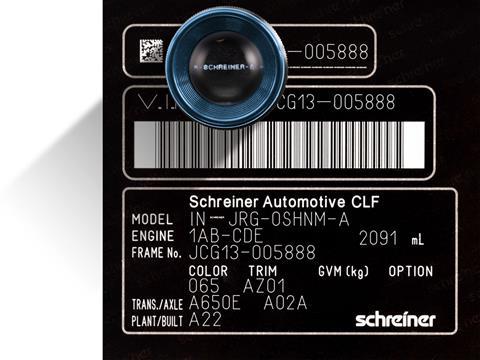
Schreiner ProTech, a Germany-based label manufacturer, has introduced an anti-counterfeiting solution featuring the application of a customized microfont on colour laser film (CLF) nameplates.
The company says that, unlike many anti-counterfeiting solutions, its new system incurs no additional costs because all required infrastructure – namely, the film and the laser equipment – is already available on customers‘ standard laser printing line operations.
Nearly indiscernible with the naked eye, the microfont can only be read under a microscope at 40-fold magnification. Its tiny size is made possible by an extremely thin (less than 1 micron) laser-sensitive film layer; by comparison, conventional laser films apparently have a layer thickness of 50 microns. The company says that this minimized coating thickness makes it possible to maximize font resolution, resulting in enhanced microscopic delicacy.
Product piracy continues to be pervasive worldwide. Just in Schreiner ProTech’s home country of Germany alone, counterfeiting causes annual losses of 54 billion euros, according to a survey by the private-sector Cologne Institute for Economic Research (IW) commissioned by the Initiative New Social Market Economy (INSM). “One in ten companies in Germany has been the victim of product and brand piracy at least once in the past five years,” says IW expert Oliver Koppel.
In terms of the chances of its product actually being counterfeited itself, the company argues that even if the microfont is detected – itself an unlikelihood with the unaided eye – counterfeiters would be hard-pressed to copy it because they lack a key component of the variable marking system: Color Laser Film, which is not freely accessible. In addition, Schreiner ProTech says its complementary Nd:YAG (neodymium-doped yttrium aluminum garnet) laser system is difficult to obtain by counterfeiters.













